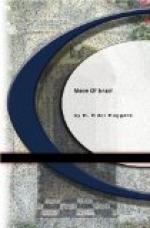Now when the Prince, Bakenkhonsu, and I heard these things we looked at each other and were silent. Only presently the Prince laughed a little, and said:
“We should have brought Ki with us, even if we had to carry him bound, that he might interpret this marvel, for it is sure that no one else can.”
“It would be hard to keep Ki bound, Prince, if he wished to go free,” answered Bakenkhonsu. “Moreover, before ever we entered the chariots at Memphis he had departed south for Thebes. I saw him go.”
“And I gave orders that he should not be allowed to return, for I hold him an ill guest, or so thinks the lady Merapi,” replied Seti with a sigh.
“Now that we are here what would the Prince do?” I asked.
“Descend to the camp of Pharaoh and say what we have to say, Ana.”
“And if he will not listen, Prince?”
“Then cry our message aloud and return.”
“And if he will not suffer us to return, Prince?”
“Then stand still and live or die as the gods may decree.”
“Truly our lord has a great heart!” exclaimed Bakenkhonsu, “and though I feel over young to die, I am minded to see the end of this matter with him,” and he laughed aloud.
But I who was afraid thought that O-ho-ho of his, which the sky seemed to echo back upon our heads, a strange and indeed a fearful sound.
Then we put on robes of ceremony that we had brought with us, but neither swords nor armour, and having eaten some food, drove on with the half of our guard towards the place where we saw the banners of Pharaoh flying about his pavilion. The rest of our guard we left encamped, bidding them, if aught happened to us, to return and make report at Memphis and in the other great cities. As we drew near to the camp the outposts saw us and challenged. But when they perceived by the light of the setting sun who it was that they challenged, a murmur went through them, of:
“The Prince of Egypt! The Prince of Egypt!” for so they had never ceased to name Seti, and they saluted with their spears and let us pass.
So at length we came to the pavilion of Pharaoh, round about which a whole regiment stood on guard. The sides of it were looped up high because of the heat of the night which was great, and within sat Pharaoh, his captains, his councillors, his priests, his magicians, and many others at meat or serving food and drink. They sat at a table that was bent like a bow, with their faces towards the entrance, and Pharaoh was in the centre of the table with his fan-bearers and butlers behind him.
We advanced into the pavilion, the Prince in the centre, Bakenkhonsu leaning on his staff on the right hand, and I, wearing the gold chain that Pharaoh Meneptah had given me, on the left, but those with us remained among the guard at the entrance.
“Who are these?” asked Amenmeses, looking up, “who come here unbidden?”




